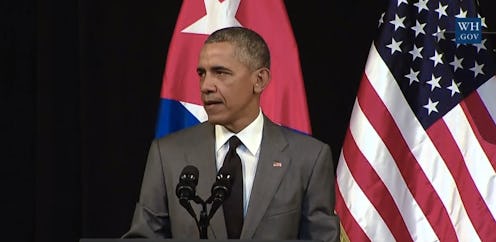News
Obama Comments On Brussels Attacks From Havana

Speaking at a historic press conference Tuesday morning at the Grand Theater in Havana, Cuba, President Obama commented on the terrorist attacks in Brussels that have killed at least 34 and wounded 187 people, at least 17 of them severely. President Raul Castro was introduced first, to much applause, providing a particularly surreal backdrop to the press conference in Cuba. President Obama then entered to even more cheering, which seemed particularly out of place for the somber occasion.
Update: ISIS has claimed responsibility for the Brussels attacks in an announcement via Amaq, a news service affiliated with the group.
First, the president asked the audience to "indulge him" and allow him to comment on the attacks in Belgium. "We stand in solidarity with them ... and we will do whatever is necessary to our friends and allies in Belgium in bringing to justice those who are responsible," Obama said. "This is yet another reminder that the world must unite. We must be together, regardless of nationality, regardless of race or faith, in fighting against the scourge of terrorism. We can and we will defeat those who threaten the security of people all around the world." And then, just like that, it was on to matters between the United States and Cuba.
That Obama's comments about Brussels were so brief is striking — but they were firm, especially in their political undertones. The remarks themselves aren't really anything surprising or new, but his reminder that we must work together across the world to fight terror has particular resonance in Cuba, where Obama became the first sitting president in nearly 90 years to visit the country this week. Clearly, his visit is one such example of bridging traditional political gaps to work together.
"We can not and should not ignore the very real differences we have" in government, Obama said later in the speech. But that is not a reason to not try to understand those differences and have a diplomatic relationship anyway. He went on to say that he's called on Congress to lift the embargo on Cuba.
It wasn't all talk of solidarity during Obama's speech in Havana. The president acknowledged that the United States has problems and that the electoral process isn't always pretty, but made it a point to add that "democracy is the way that we solve them." Despite the apparent dig at Cuba's communist system, Obama said that he's "come here to bury the remnants of the Cold War in the Americas" which have kept the United States and Cuba separate, and to make the embargo "one chapter in a longer story of family and of friendship."
He ended his speech with "Si, se puede," which translates to "Yes, it is possible." Or in other words, "Yes we can." While Obama famously borrowed the phrase for his 2008 campaign, it has its roots in the United Farm Workers labor rights movement, which was led by Cesar Chavez.
One can only imagine that following these horrific attacks, the rest of the European Union and the United States will get behind Brussels and help in any way possible.